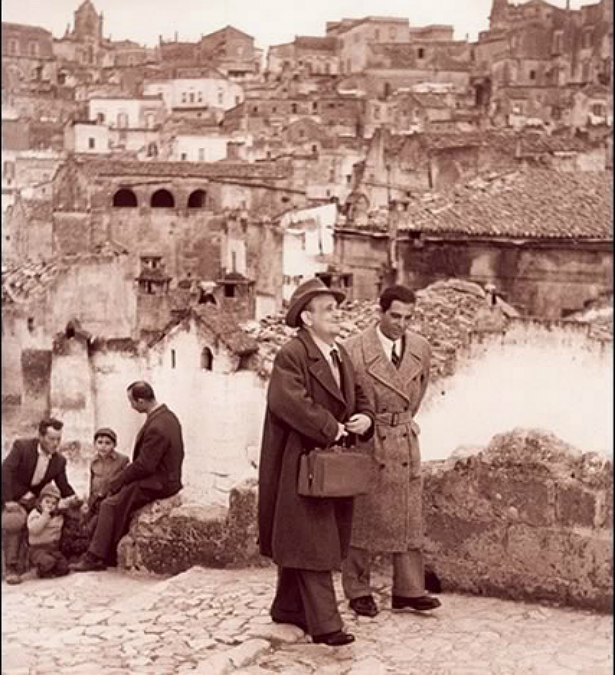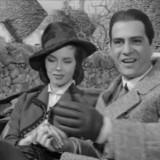I saw this charming Italian comedy the other night on YouTube projected on my big screen and tried to imagine some of the thoughts that ran through audiences’ minds who saw it for the first time in Italian movie theaters in the early 60’s.
[youtube width=”615″ height=”470″]http://youtu.be/uxzYEqxrZHE[/youtube]
Complete film
I guess it reminded me of that startup findery.com I read about, where people leave their notes attached to physical places around the world. So a place, in this case a movie, could potentially carry past mental mementos of all people that experienced it before you. And when you marry physical with digital worlds you get to experience a much deeper view that elegantly overcomes time and space. The result is a blend of your personal impressions with others’. In digital business it’s called innovation.
Going back to the film, I’d say audiences at the time might have recalled that dramatic chapter in Italian history and could have correlated themes in this movie with similar political coverups of their day, concluding there’s nothing new under the sun. This is in fact, the consistent recipe of all films in the Comedia all’italiana (Italian comedy) genre; they make you laugh of the comic situations, and by sending bitter criticism darts at current affairs, thus making audience relate on dual layers.
The film tells the story of Omero Battifiori, played skillfully by the great Nino Manfredi, an insurance broker who visits a small town in Puglia during the early 30’s fascist years. The authorities who had received a telegram that a high rank fascist party inspector is about to arrive from Rome, mistakenly thinks Omero is that top official. This misunderstanding is the premise for a comedy of errors that ensues where the town authorities, led by mayor Salvatore Acquamano (Nino Cervi) are turning the city upside down to show their good side to Omero, while concealing their mismanagement failures.
Omero Battifiori (Nino Manfredi) in a scenic ride with the mayor’s daughter Elvira Acquamano
(Michèle Mercier) and the Trulli houses in the background (mouse over image to learn more)
I liked some of the archival footage featuring Mussolini’s in various public stunts, which helped cement the erratic socio-political charged atmosphere that lended itself to constant fellow suspicion and blind obedience. Exception to this rule, is the portrayal of the anti-fascist Dr. De Vincenzi, played by reticent, yet the tell-it-as-it is Salvo Randone. You may remember him from Francesco Rosi’s 1963 masterpiece Hands over the City – Le Mani Sulla Città.
I guess that’s what so genuine in cinema, you get to see actors/actresses you saw in other films and that thread of familiarity helps build their performance range in your head. In most cases, it could be a consistent typecast that persists (think Tiberio Murgia), in other cases it’s a complete atypical casting or drastic marginality that may reflects simply an evolution stage in acting career. For me that moment was the final scene when tipsy Omero spills the beans on his identity. In the crowd there was a face of an actor who doesn’t have any lines who simply watches on, but in Alessandro Blasetti’s 1954 film, 8 years prior, he played a police commissioner with dominant presence. This is especially true when you watch movies from a specific cinematic period, say early 60’s. There is that finite bank of actors that is being utilized over and over until they feel like old friends, even under different roles.
 Omero Battifiori (Nino Manfredi) strolling with Dr. De Vincenzi (Salvo Randone) against a panoramic
Omero Battifiori (Nino Manfredi) strolling with Dr. De Vincenzi (Salvo Randone) against a panoramic
view of the village. Film was shot in Sassi di Matera and Ostuni in Puglia
There are some nice outdoors scenes showcasing the famous Truli houses in Puglia and panoramic shots of a local village where Omero meets the poor locals that confronted him with their misfortunes. That scene reminded me a later collaboration between Ettore Scola (a scriptwriter in this film), and Nino Manfredi – the 1976 Ugly, Dirty and Bad (Brutti, sporchi e cattivi), a grotesque story about a poor family in a shanty town in outskirts of Rome. Could it be that the creative seed was planted here? Maybe.
In summary, you can watch the film right here (no English subs, though) and get a glimpse of Nino Manfredi’s early career performance, some archival footage, small town hypocrisy during fascist era, the quaint Truli houses, and another great soundtrack from composer Pierro Piccioni.
Buona visione!


